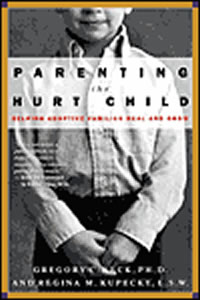 Parenting the Hurt Child by: Gregory C. Keck, PhD. and Regina M. Kupecky L.S.W.
Parenting the Hurt Child by: Gregory C. Keck, PhD. and Regina M. Kupecky L.S.W.
This book is filled with valuable information, insight, and resources for those who adopt older children with a history of trauma. The authors propose, early childhood trauma can be healed by, nurturing parenting in non-traditional forms.
The introduction of this book lays the foundation with these words:
“…foster and adoptive parents are not responsible for their children’s problems. But they are responsible for creating the proper environment for change, the motivation for growth, the direction for improvement, and the security needed for comfortable attachment. Their roles are extensive, and if they are not fulfilled, their children cannot get well.”
At the same time Keck and Kupecky, stress that while parenting a hurt child is an awesome responsibility they encourage parents to believe that living with challenging children can and should be fun.
The book consists of 12 chapters with six clear themes.
- 1- A review of attachment definitions and theory. Describing how early childhood trauma changes a child’s life, and includes information about therapy that can help heal the emotional scars of trauma.
- 2- Parenting tactics including information about choices that do work: avoiding control battles when possible, staying flexible, managing parental anger, and keeping realistic expectations.
- 3- Nurturing hurt children with an extensive list of ways to nurture that are emotionally and physically safe, and don’t cost a fortune.
- 4- Information for parents to help school personnel understand the unique dynamics of children who have traumatic pasts. With suggestions about how parents can make sure the school teaches children in a way that will sever them well.
- 5- Discusses how some hurt children are resistant to changing inappropriate behaviors, the child learned to use as a survival tactic before they found a safe and loving home. This theme clearly outlines the fact that some children will make only minimal effort about correcting their behaviors, despite the efforts of their parents.
- 6- Throughout the book there are resource lists of parenting tips, lists of agencies that can help and a bibliography of additional reading materials parents may find supportive.
This book is a warmly supportive resource for parents who are chilled by the challenges their children present. Parents looking for a smooth flowing, sequential guide to parenting may be frustrated with this book. However, those parents willing to look for practical, tried and true, sometimes humorous support for raising a hurt child will read this book and feel satisfied.
The emotional and behavioral demands of older adopted children often overwhelm the best intentions of loving parents. Parenting the Hurt Child may be a source of relief for parents who want and need ideas for handling problems that threaten to undermine the progress of helping a hurt child heal.
![]() Special Needs and Adoption-Related Terms:
Special Needs and Adoption-Related Terms:
A | B | C | D | E-F | G-H-I | J-K-L | M | N-O | P | Q-R | S | T-U-V-W-X-Y-Z
For more information about parenting special needs children you might want to visit the Families.com Special Needs Blog and the Mental Health Blog. Or visit my personal website.

